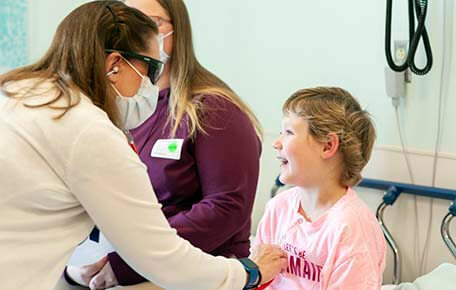Many parents who think their child has neurofibromatosis type 1 (NF1) are scared. You may not have even heard of this disorder. You want answers to your questions, a treatment plan for your child, and an idea of what the future looks like.
At UVA Health Children’s, we often see children with NF1. Besides a diagnosis, we also provide ongoing support for families and treatment plans that span into adulthood.
Diagnosing & Treating Neurofibromatosis Type 1 at UVA Health Children’s
If your child is showing early signs of NF, they’ll be seen by a geneticist at UVA Health Children’s. Our genetic counselors will look for early symptoms like:
- Café au lait spots – large, slightly dark patches on your child’s skin
- Freckles – freckles in their the armpit and groin areas
- Lisch nodules – tiny bumps on the colored parts (iris) of their eyes
They’ll talk to you and your child to see if they’ve been having headaches or signs of a learning disability. They’ll also do a physical exam, looking for signs like a shorter stature or small bumps under the skin.
If your child has many of these symptoms, we’ll test them with a cheek swab. Cheek swabs are a painless way to look at genes, which is how we spot NF.
NF1 & Your Family
Because NF1 is genetic, more than one family member may have it.
If your child tests positive for NF1, we can also test the rest of your family. We’ll schedule your child for regular follow-up visits.
What To Expect at Your Follow-Up Neurofibromatosis Visits
Neurofibromatosis is a lifelong condition. But symptoms and issues can be managed. We’ll meet with you and your child regularly to make sure they have everything they need to thrive.
NF1 can lead to:
- Tumors on the nerves
- Scoliosis
- ADHD
- Optic nerve gliomas
- Speech issues
- High blood pressure
- Stroke
- Increased risk of breast cancer
- Leukemia
- Pheochromocytomas
Our follow-up appointments are designed to catch these conditions quickly. With early treatment, outcomes are much better.
Tumor Monitoring
We’ll do regular imaging scans to check your child for any tumor growth. While some tumors can be monitored and don’t need surgery, others we’ll want to remove right away.
As a children’s hospital, UVA Health Children’s is familiar with imaging needs of kids. Our radiologists work with children all day. They know how to make your child feels comfortable in an uncomfortable situation.
We also use low-dose imaging. This is especially important for children with ongoing medical issues who will need a lot of imaging in their lifetimes.

Comprehensive Cancer Care
NF1 puts your child at a higher risk for some types of cancer. UVA Health Children’s has a comprehensive care cancer clinic. We also have infusion rooms just for kids and other resources to improve treatment.
Scoliosis Checks
Scoliosis is often seen in children with NF. At your follow-up visits, we’ll check your child’s spinal health. If needed, we can help them with physical therapy, bracing, or spinal surgery.
Scoliosis in NF1 patients can happen in 2 ways. The first is basically the same as any case of scoliosis. But NF1 patients can also develop dystrophic scoliosis. This form includes other issues like kyphosis or rib thinning. We have experience with both forms of scoliosis and can talk to you about all your treatment options.
Optometrist Visits
Neurofibromatosis puts your child at higher risk for optic nerve gliomas. Spotting it early is important. The earlier treatment starts, the better the outcomes.
Neurologist Visits
Many people with NF have a larger head circumference. That isn’t a problem on its own. But if your child’s head is getting larger, we’ll have a neurologist take a look. Rarely, increasing head size can be an early sign of a brain tumor.
Developmental & Behavioral Health
People with NF1 often also have conditions like ADHD or learning disabilities. If your child begins to show symptoms of these conditions, we can test them.
Based on your child’s testing, we can help create an education plan, recommend medicines, or help with therapy.
Rehabilitation & Therapy Services
Many children with NF1 develop issues with speech. This can include problems with:
- Pitch
- Volume
- Stuttering
- Delays
Speech therapists can help your child with these concerns.
At UVA Health Children’s, we can provide help with all of these issues as your child needs them. For services you’ll need to use often, we can also coordinate care with your child’s local provider. With several locations, we may even have specialists in your community.
Neurofibromatosis Type 1 FAQs
You’ll have a lot of questions throughout the course of your child’s treatment. You can always ask us, in person, or through MyChart. But here are answers to some of the most frequently asked questions.
How common is neurofibromatosis type 1?
Even though neurofibromatosis isn’t something most people think about, it is fairly common. NF1 occurs in 1 person out of every 3,000. That’s almost as common as cleft lips.
What’s life expectancy like for someone with NF1?
With proper treatment, people with NF1 have a normal lifespan.
How do I explain this to my child?
There’s no easy way to talk to your child about a lifelong condition. If you’re struggling to find the right words, ask to talk to a member of our Child Life program. They’re experienced with explaining complex medical conditions to even very young children.
Could my child still have NF1 even if their genetic test shows no mutation?
Almost 95% of people with NF1 will show up on genetic testing. But that still leaves 5% who won’t. If your child has all the symptoms of NF1, we might suggest a clinical diagnosis.
What about when my child grows up?
We also care for adults with NF1. As your child grows up, we’ll help transition them to adult care.